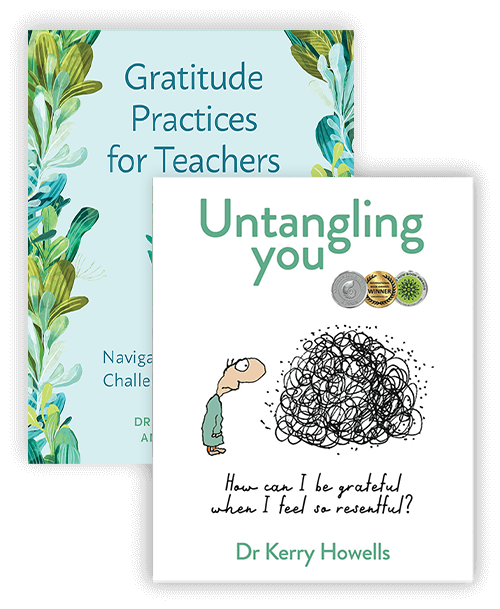The internet is full of strategies, tips and techniques for bringing more gratitude into our lives. There has been an exponential rise in the number of academic papers, popular and scholarly texts, websites and news items that focus on gratitude. These often promise us greater physical and psychological wellbeing and it’s true that if we bring more gratitude into our lives we can feel calmer and happier. One of the most highly recommended strategies is to write down three things we are grateful for at the end of our day.
While this is a powerful strategy, I have concerns that the popular movement towards gratitude runs the risk of inadvertently causing us to become more self-focused. To me the power of gratitude lies in its potential to connect with others, and to make our acts of gratitude more about affirming what we receive from others. Therefore, an extension of what we are grateful for could also incorporate how we are going to express that gratitude towards someone the following day. Here our gratitude can be reciprocal but it can also have a “paying it forward” intention that is not necessarily directed at the person to whom we feel grateful.
A danger in only reflecting on gratitude is that it can mask other areas of character change that are calling out for our attention. A wonderful outcome of a conscious focus on gratitude is that it shines a light on states that are prohibitive of gratitude – on those that make gratitude difficult. These include envy, entitlement, victim mentality, narcissism, resentment, arrogance, and self-righteousness.
If a question for us at the end of the day was: “To whom was it difficult for me to express gratitude to today?” no doubt our awareness of some of these other states would be expanded. They might bring up occasions when we have been judgmental, backbiting or where we might have complained about our expectations not being met, or been too self-focused.
Of course, gratitude can only perform this illuminating role if it is based on its pillars of humility, courage, empathy and integrity. It takes all of these to honestly answer this question at the end of the day, and to be able to find a way to change a situation. Note that this is not about changing other people, but about changing ourselves so that a situation can change.
This process will be much easier if we can refrain from being in perfection mode; we need to be able to admit our mistakes, see our flaws, and not judge ourselves for not being perfect. Integrity is not about always being grateful or always being a great person. Integrity is about having the courage and humility to reflect on where we could have been more loving, more giving, more grateful, and where we may have gone off track. Integrity is about making a decision to get back on track.
If we have a tendency towards perfection in our behaviour (note that I have not called it perfectionism as I don’t believe it is a fixed part of ourselves), we also need to watch out for complacency. Often if we can’t be perfect we give up too quickly.
Gratitude can only reach its true potential if we are committed to not only furthering our wellbeing, but also developing our character. This is a grand endeavour and what I believe we are on the planet to do. When we leave this world, it will be our character that we take with us and it will be the impact of our character that we will leave behind.
A focus on becoming a better person is possibly one of the most fulfilling endeavours of our lives. It is the source of deep calm, deep happiness, deep fulfillment. It is never-ending.
However, just like any other grand endeavour, a commitment to character change is not easy. It needs to have goals. What aspects of our character do we want to change? What characteristics do we want to develop more?
Sometimes it helps to find someone who emulates a characteristic we want to develop and to copy what they do until it becomes part of ourselves. Letting them know that we would like to have more of what they have is a wonderful expression of gratitude to others.
Possibly one of the most important rituals or habits we can build into the end of our day is the one of written reflection. It’s great to start this off by writing about what we are most grateful for from our day and then to whom we wish to express gratitude tomorrow? The following additional questions will also allow gratitude to perform its truly transformative role:
- To whom was it difficult to express gratitude today?
- How can I address the underlying reasons for this?
- How can I change my character tomorrow?
All the best on your journey of deepening gratitude,
Kerry






